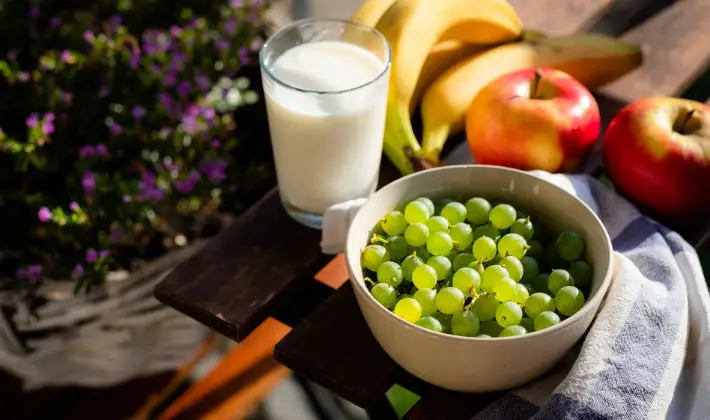The Best Diet And Nutrition For Long Distance Runners

A lot of runners focus on what not to eat or drink but it is equally important to know what to eat to properly fuel your body to achieve peak performance and overall good health. Food contains macro and micronutrients that play different roles in the way energy is delivered to our body.
You will find a dietary plan for long distance runners and marathoners in this article. It includes information about what kind of food you should eat before and after the run.
Diet For Long Distance Runners
1. Carbohydrates
Carbs (both simple & complex) are the primary source of energy for runners since our bodies burn energy supplied by carbs more efficiently and quickly (vs. proteins or fats).
For long distance runners, carbs should form about 60-65% of the total calorie intake during training. There are plenty of good sources of carbs including brown rice, whole grain pasta or bread, lentils, fruits, potatoes and other starchy veggies such as corn, beans, etc.
Less processed carbs provide more fiber but do avoid adding a lot of fiber to your diet in a short span of time as this may cause uncomfortable symptoms.
During long runs or speed work, the body burns through glycogen relatively quickly and you need to replenish your glycogen stores during the run to avoid onset of sudden fatigue usually termed as “bonking” or “hitting the wall”
2. Protein
Our bodies require protein mainly to repair and build tissue damaged during exercise. Similar to carbs, try and consume less processed proteins. Good sources of protein include chicken breast, fish, poultry, lean pork, low-fat dairy products, beans, eggs, etc.
While protein is not a primary energy source (and hence not a major component of mid-run fueling), it should be a part of your everyday diet and post-run recovery plan.
3. Fats
Fats help regulate hormones, help the absorption of certain vitamins and reduce inflammation. Runners should try and limit intake of saturated fats while increasing intake of omega-3 fatty acids.
Healthy fats include cold-water fish (e.g. salmon, sardines, and mackerel), nuts, avocados, olive oil, seeds (like chia & flax), etc.
While consuming healthy fats is good for having backup energy stores (for long runs), fat intake during a run should be kept to the minimum since it takes a while for the body to convert fat into fuel (which leaves you feeling too full and possibly with an upset tummy on your run).
4. Vitamins and minerals
While vitamins do not provide the body with energy, they do help combat and neutralize the damaging effect of free radicals produced in the body after exercising.
Important minerals that need to be included in any runners’ diets include calcium (prevents osteoporosis and stress fractures), iron (helps deliver oxygen to the body’s cells), and sodium & other electrolytes.
While dairy products, calcium-fortified juices, leafy green vegetables, nuts and seeds, legumes, and eggs are good sources of calcium, iron can be found in lean meats, leafy green vegetables, nuts, and shellfish.
Sodium and electrolytes need to be replenished during runs longer than 90 minutes by either drinking a sports drink or taking in salt/salt pills during the run.
5. Hydration
Even mild dehydration can adversely impact performance. Your hydration needs before, during, and after a run depending on how long you will be running and your sweat rate. Two good rules to help you: (1) Weigh yourself before and after a run to know how much fluid needs to be replaced, and (2) Check the colour of your urine. Pale yellow urine means adequate hydration while dark yellow means you are dehydrated.
Food to Eat and Avoid Before a Run/Race
Now that we have covered the basics of nutrition, let us move to fuel for a run/ race. Correct fueling pre-run and during the run can be the difference between a run to feel proud of and a run you would rather forget.
But getting your pre-run, during-run, and post-run fuelling right (what to eat and when to eat it) takes time and lots of trial and error. But here are a few basic guidelines you can use.
1. Regularly consuming a well rounded diet
A runner’s diet should include a good balance of the three macronutrients – carbohydrates for energy, protein for muscle recovery and fats for energy and cell growth – as well as plenty of vitamins and minerals.
Runners also lose a lot of electrolytes during run especially if the weather is warm or the run is long, so sprinkling some salt on pre run meals or having some salty snacks can help with the sodium loss.
2. Make sure you hydrate
Running when not adequately hydrated makes the run seem much tougher, leaves you more fatigued and prone to muscle cramp or even dizzy spells.
More importantly, to be well hydrated, you need to drink fluids at regular intervals throughout the day– and not just hours before your run. Hydrating during the run is of utmost importance – do not wait to feel thirsty before drinking – feeling the thirst means you are already dehydrated!
3. Remember that fueling can vary by type of run
All runs are not created equal. The amount of energy you require for a 20-mile marathon training run will differ from your requirements for an intense interval session or for a steady 5k.
Here are some pointers for what to eat before every type of run to maximize your performance.
Easy run up to 60 minutes
Short and easy runs are the mainstay of many training plans. It is quite likely that your body will have enough glycogen stored to fuel easy /steady runs for up to 60 minutes.
But if you still feel the need of a pre-run energy hit, go for a low-fibre snack containing simple carbs such as a banana or some dates or handful of almonds around an hour to 30 minutes beforehand.
Runs over 60 minutes
If you are running long distances you may find your energy levels begin to dip as your glycogen stores deplete. To avoid feeling zapped out of all energy, fuel your run with a pre-run snack or a small, easily digestible meal (low in fat/ protein/ fibre + high on simple carbs).
A sweet potato, porridge with toppings (like banana, berries, nuts, nut butter, etc.), oatmeal, smoothie, banana with nut butter, a bagel/ toast with hummus/ nut butter/ jam, granola/ granola bars, dates with nut butter, low fibre cereal, yogurt with granola are all good options optimally consumed 1-2 hours before the run.
But if you find yourself eating within a 30-min time period before the run/ race, opt for quick-acting carbs without much fiber, such as banana, dry cereal, dates or dried fruits. And if you only have 15 minutes, try an energy gel or chew to provide that boost!
Longer runs over 90 minutes
It is recommended to fuel during your run too. Try having simple carbohydrates as they provide the quickest energy. Also it is best to fuel earlier rather than later since your body needs time to process the carbohydrates.
A usual ballpark figure to aim for is about 200–300 calories with 30-60 gms of carbs per hour of running (dependent on individuals’ metabolism). A lot of runners use energy gels or chews or protein bars but for some it can cause stomach distress.
Others prefer real food like peanut butter pretzels, granola bars, bananas, raisins, dates, homemade granola/ energy bars, etc. the other option is to ‘drink your calories in the form of energy drinks.
For runs that last several hours or more, consider mixing in some fat and a small amount of protein that will help you feel satiated as well as speed up the recovery
Interval running sessions
During any run, you burn both fat and carbohydrates but the ratio of each changes depending on the intensity of the run. During speed sessions we tend to use a higher portion of glycogen as compared to longer (but easy) runs.
So eat well during the day (or night before) and consume a simple carb snack around an hour pre-workout to avoid struggling on the final repeats. But at the same time avoid high-intensity workouts on a full stomach.
4. Don’t Cut Carbs
Over years, carbs have got a bad rap and people try to reduce their carb intake which can be disastrous as a runner since runners usually need slightly more carbs than the average person.
Carbs are best digested when they’re spread out throughout the day. Having a mix of both complex carbs (like whole grain foods such as brown rice, beans, potatoes and vegetables, etc) as well as simple carbs (like banana, energy bar, etc) works well for different needs.
Complex carbs take longer to break down in the body and provide slow-release energy hence these should be eaten 2-3 hours before a run to give your body time to digest. On the other hand, for a quicker energy hit, reach for the simple carbs which are broken down quickly providing a faster energy release (ideally consumed an hour to 30 min before a run).
5. Eat early and Don’t over-eat
Eat early (rather than later) and do not over stuff yourself. Keep in mind that eating more carbs means shifting the balance of calories (in favour of carbs), not necessarily consuming more calories (than required). Overeating or eating late (with less time for stomach to digest food) the night before- might just end up leaving you with a heavy feeling and a not-so-happy run. So just stick to your normal portion size and choose a high-carb recipe.
Some options are brown rice with fish/chicken, roasted chicken and potato, brown rice risotto, stuffed baked potatoes, whole grain pastas with pesto/red sauce, turkey sandwich/ salmon burger, grilled fish or chicken, pizza with toppings (but a reasonable serving size), quesadillas, etc.
6. Avoid spicy food, high fibre and high fat food.
If you are generally prone to digestive discomfort, avoid anything too spicy OR too much fibre or too much fat too close to a run can also have unwanted effects. While capsaicin (found in chillies) is an irritant to the body and aggravate the stomach lining, fibrous or high fat foods (e.g. cheese, whole grains, legumes, fruit with skin and veggies like cauliflower, cabbage, broccoli, etc) leave you feeling fuller/ heavier and can also make you need the loo.
Also limit caffeine and alcohol as they will only dehydrate your body
7. Carb loading (for race) does not mean bingeing on carbs just a day prior!
Although eating complex carbohydrates is an important component of the pre-race/ pre long run day diet, “carb loading” just one day prior could harm your performance. Despite popular belief, you should avoid carb-loading just the day before your long distance race.
The carb reserve needs to be built over time into all your meals during the training with a little uptake during the last 1 week leading to the race. Binging on carbs at the last day will only lead to GI issues or a lethargic body
8. Nothing new
Do not try anything totally new before a race. The best recommendation is to experiment to see what works for you.
Your routine long runs are the best place to start – pay attention during your runs on how you are feeling. This will provide a good indicator if last night’s dinner was the right meal for you.
Over time you should be able to make a list of foods you know you need to avoid as well as the foods that work really well for you the night before a long run.
Even for pre-run and during-run fueling, you should have ideally experimented eating different food items, different food combinations, different quantities and different times before and during your run to find what works for you, does not upset your stomach during your run and gives you energy to fuel your run
Keep in mind that what may work for one runner may or may not work for another. Everyone’s digestive system reacts differently to various foods. Also, remember, what worked for you during one training cycle may not work for you during the next cycle!
What Should you Eat after your Run?
While pre-run and during-run fueling is important to have a good strong run, post-run fueling is equally important for recovery (to replenish glycogen stores, replace lost electrolytes and rebuild broken down muscle). For your post run nutrition, aim for roughly a 3:1 or 4:1 ratio of carbs to protein. If you feel queasy right after a long run, try liquid nutrition first (e.g. a smoothie), then aim for a full meal later.
1. Make it timely
Do aim to eat something within 30 minutes after finishing a long run or a hard session to keep your blood sugar levels stable and start the recovery process. But if you are unable to eat within 30min, aim to eat a full meal within 2-3 hours of your run.
2. Eat protein and carbs
Eat carb heavy foods to replenish your glycogen stores and combine these with protein to help recover and repair your muscles. Some good options would be a smoothie (with fruit & milk), a glass of chocolate milk, yogurt with fruit and nuts, a wholemeal bread/ bagel with peanut butter, protein bar which has both carbs and protein, high protein oatmeal or pancake.
3. Replace your salts
If you’ve been working out in hot weather or sweating excessively you may need to replace some of the sodium you’ve lost with some salt pills (1-2 depending on how much did you sweat)
4. Hydrate
You not only need to hydrate during your run, immediately post your run BUT all throughout the day after a long run or hard workout or any workout in hot weather.
Remember- Just Like You Practice Your Running, You Need To Practice Your Fueling!





